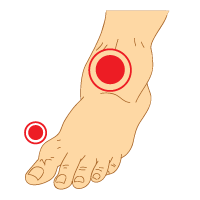Arthritis occurs when certain joints in your body become painful, stiff and inflamed. The foot and ankle are two of the most common areas for arthritis to first develop. If you have arthritis of the foot and/or ankle, you will notice that walking, standing and other physical activities are difficult and painful.
Types of Arthritis
When it comes to arthritis of the foot and ankle, the 3 most common types are Osteoarthritis, Rheumatoid Arthritis and Post-traumatic Arthritis.
This type of arthritis involves the degeneration of the joint over time. The cartilage in your joints wears down gradually, reducing the space between your bones. This can result in the development of bone spurs (also called osteophytes). Causes of osteoarthritis include heredity and being overweight.
Rheumatoid Arthritis
This is an autoimmune disease that attacks the synovial membrane of your joints. This causes swelling, pain and stiffness of the affected joints. The true cause of rheumatoid arthritis is unknown, but there may be a genetic component involved. It is also believed to be brought on by infection.
Post-traumatic Arthritis
This type of arthritis develops after an injury to the joint, usually a fracture or dislocation.
Signs & Symptoms
- Pain & swelling
- Reduced mobility
- Inflammation
- Pain that worsens with physical activity
- Deformities of the joint
- Pain that worsens with rest
- Decreased range of motion
Treatments
Weight Loss
Losing weight can reduce the pressure being placed on your foot and ankle. This can help relieve the symptoms of your arthritis.
Rest
Try to stay off your feet when you can. Resting will help to keep your symptoms at bay. Consider using a cane.
Medication
NSAIDs like Advil and Aleve help relieve pain and reduce inflammation. Cortisone shots are also used to treat the inflammation associated with arthritis. DMARDs (disease modifying anti-rheumatic drugs) work to prevent damage to the joints, along with treating pain and inflammation.
